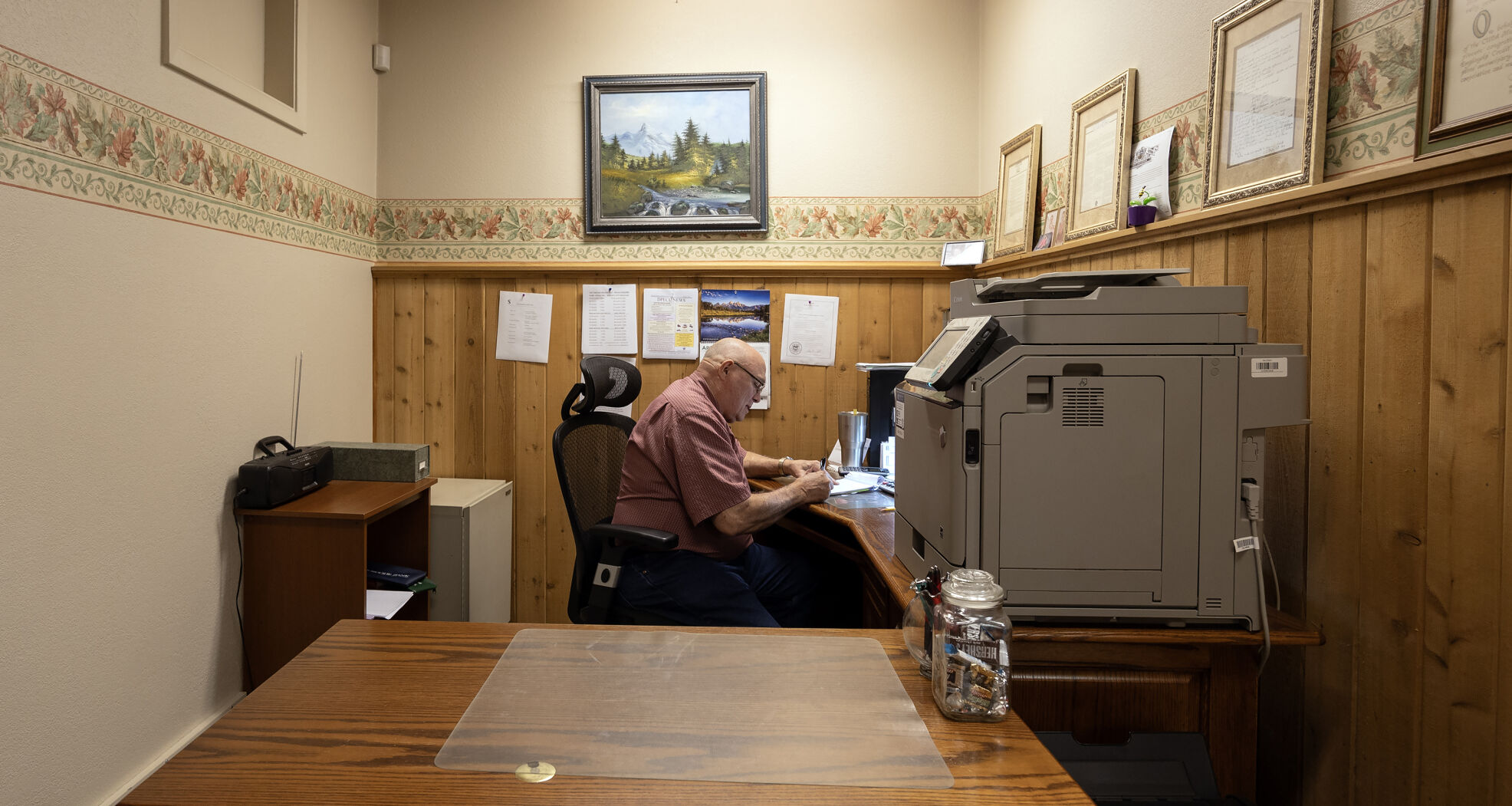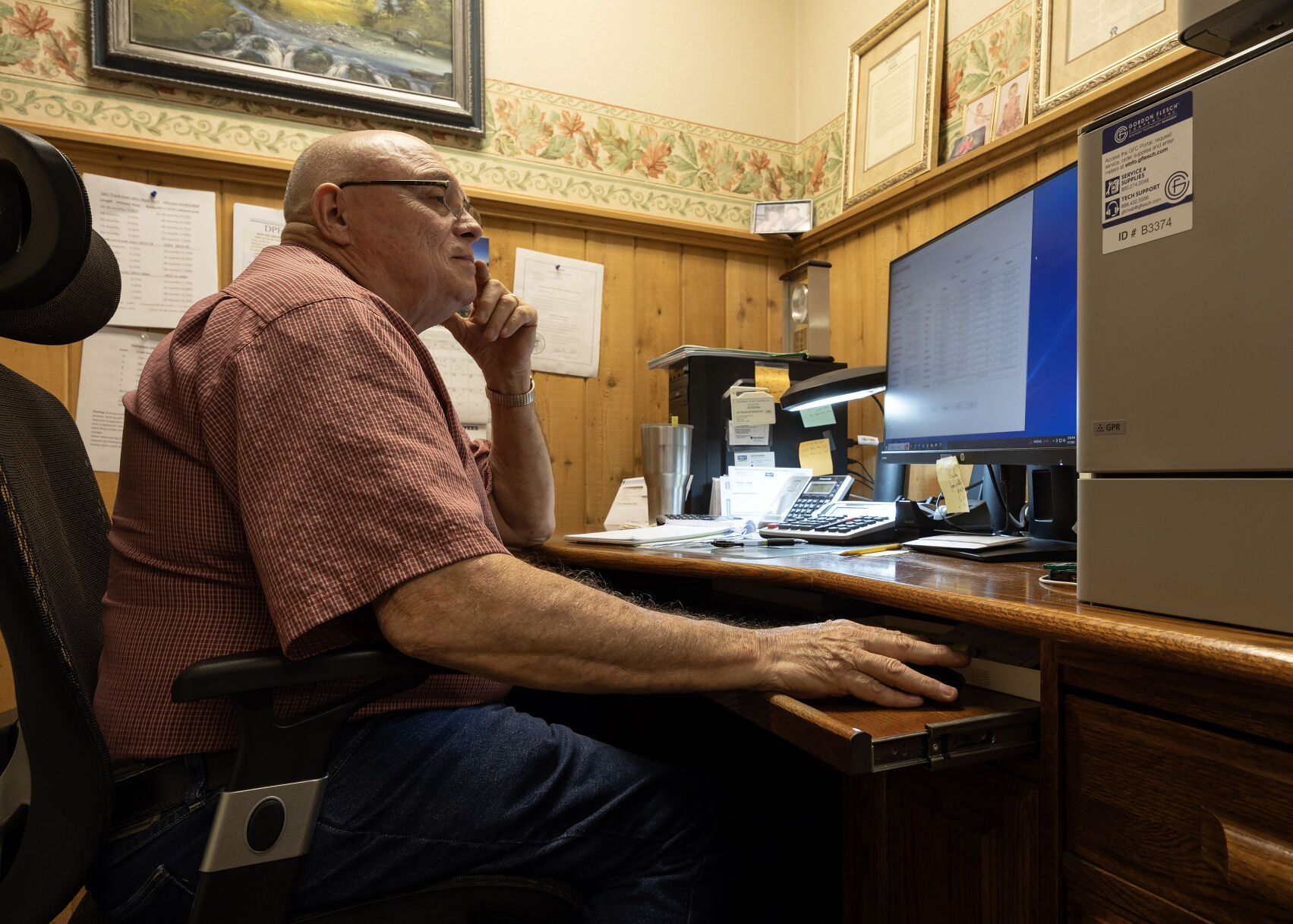The Dubuque Postal Employees Credit Union’s most recent newsletter shares a variety of information.
It includes current loan rates, details about the credit union’s recent annual member dinner and a scholarship announcement.
Under each item is the same phrase: “Call Butch today.”
Ray “Butch” Pregler is the lone employee of DPECU, which for 97 years has provided financial services — primarily loans and savings accounts — to Dubuque postal service workers.
Pregler has steered the ship since taking over for his predecessor, Bob Keller, in Oct. 2011. Pregler is a retired postal worker who spent 41 years with USPS working as a carrier and in vehicle operations. For DPECU members with banking business to conduct, Pregler’s the guy.
Founded in 1927, DPECU is the oldest credit union in Dubuque and one of the oldest in Iowa. It currently serves 310 members, who must be either postal workers or a postal workers’ spouse, child, grandchild, stepchild or parent.
“Our people are very dedicated,” Pregler said. “I know everyone by heart who belongs to the credit union, and I know their kids. That’s good security.”
The union has humble beginnings. Over the years it has operated in a variety of locales, including various basements and the Historic Federal Building before moving to its current home at 1155 Loras Boulevard — a former beauty salon.
At its genesis, the credit union served as a safety net for postal service workers who needed money in a time when the career wasn’t lucrative. Federal Reserve data shows the average annual salary for a postal worker in 1927 was $2,129, which would equate to roughly $25,000 in today’s economy.
“They didn’t get paid a lot, because it took an act of Congress to give them a raise,” Pregler said. “The norm was to put in maybe $5 (in an account), that was a lot back then.”
Over the early years of DPECU, membership privilege was exclusively permitted to postal workers. Its membership hovered around 300 for the majority of the past 40 years.
However, those numbers haven’t always been so strong.
Membership in 2005 was 333, and then it dipped to 313 in 2006. By 2012, it has fallen to 250.
Pregler, who had just started as DPECU’s lone employee just months earlier in 2011, pushed for a change to expand the credit union’s membership.
“I talked to the board and said this is stupid,” Pregler said of the exclusive memberships. “The credit union would have dried up (without a change).”
The DPECU nine-person board approved a bylaw change that allowed members’ spouses to also utilize DPECU services.
Then, a year later, after a fair amount of politics, Pregler successfully lobbied the board — on which he himself has served since 1999 — to agree to also allow the children, grandchildren, great-grandchildren, step-children and parents of USPS workers to become members.
“It was essentially a move to ensure our existence into the future,” Pregler said.
DPECU currently serves 310 members and has $4.2 million in assets. Pregler, as the lone employee, handles all transactions during his office hours from 1 p.m. to 5 p.m. Tuesday, Wednesday and Thursday. Members come and go throughout the afternoon dropping off checks and conducting business.
He says DPECU has no delinquent accounts, which puts it in good standing with federal regulators.
There’s a reason for that.
“It’s because I know everybody,” Pregler said. “(Not paying) is like betraying a friend. If they are late on a payment, I give them a call.”
DPECU does not use online or electronic banking, nor does it have any cash on hand. At the end of the day, Pregler turns off the computer and all business ceases until he fires it up again.
“If someone comes in and wants a thousand bucks out of their account, I write them a check,” Pregler said.
Pregler admits its an old-school way of doing things, and is a bit of a barrier when trying to sign up new, younger members. But he insists it’s the best way.
“We have the lowest rates because we don’t have a high overhead,” Pregler said. “And we have the highest dividends.”
Finding new, younger members is a challenge. Word of mouth among USPS employees is the best way to advertise to younger members, Pregler said.
Mark Giese serves as DPECU board chairman. He said the benefits of a small credit union like DPECU sell themselves.
“We have good dividend rates and good car loan rates,” Giese said. “We try to be competitive with everyone else — the dealerships and other institutions. It’s a good group we have here. There aren’t a whole lot of members so you tend to know everyone.”
Pregler doesn’t have a background in finance, but when Keller expressed the need to retire due to deteriorating eyesight in 2011, Pregler stepped in. After a couple months of mentorship, he was ready to roll.
Even today, though, Pregler sometimes needs to lean on his friends.
“I have no banking experience, but I have backups,” Pregler said. “A good friend of mine, who was a postmaster, has a degree in finance, so if I have a problem I call him. I have software people … And if I have problem with some figures that aren’t coming out, I’ll call someone.”
Pregler educated himself by learning the DPECU bylaws — which are handwritten — and following the various, ever-changing federal regulations with which he must ensure the credit union complies.
But his primary duty is the same one DPECU has fulfilled over its 97-year history.
“Our purpose is to help out our members,” Pregler said. “I’ll have people come in and tell me they don’t know what to do, so I’ll come in and try to work something out to help them. You can’t do it all, but you might be able to add to their car loan or help them take out an unsecured loan. I kind of pride myself in helping people. It gives me a good feeling.”






